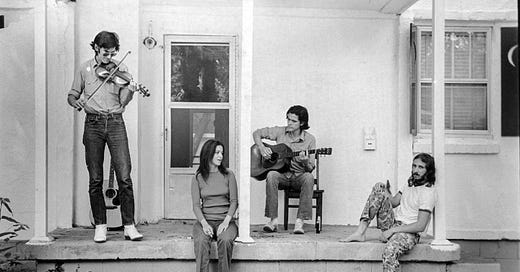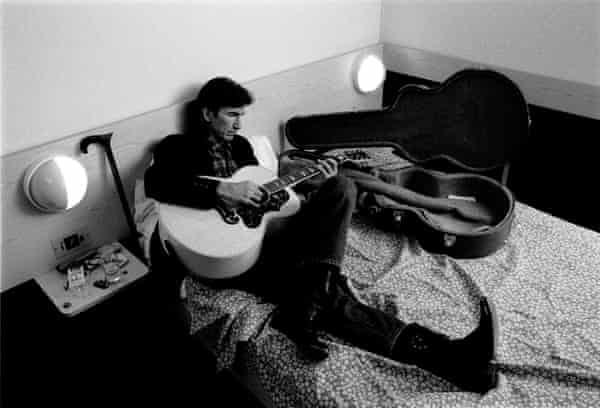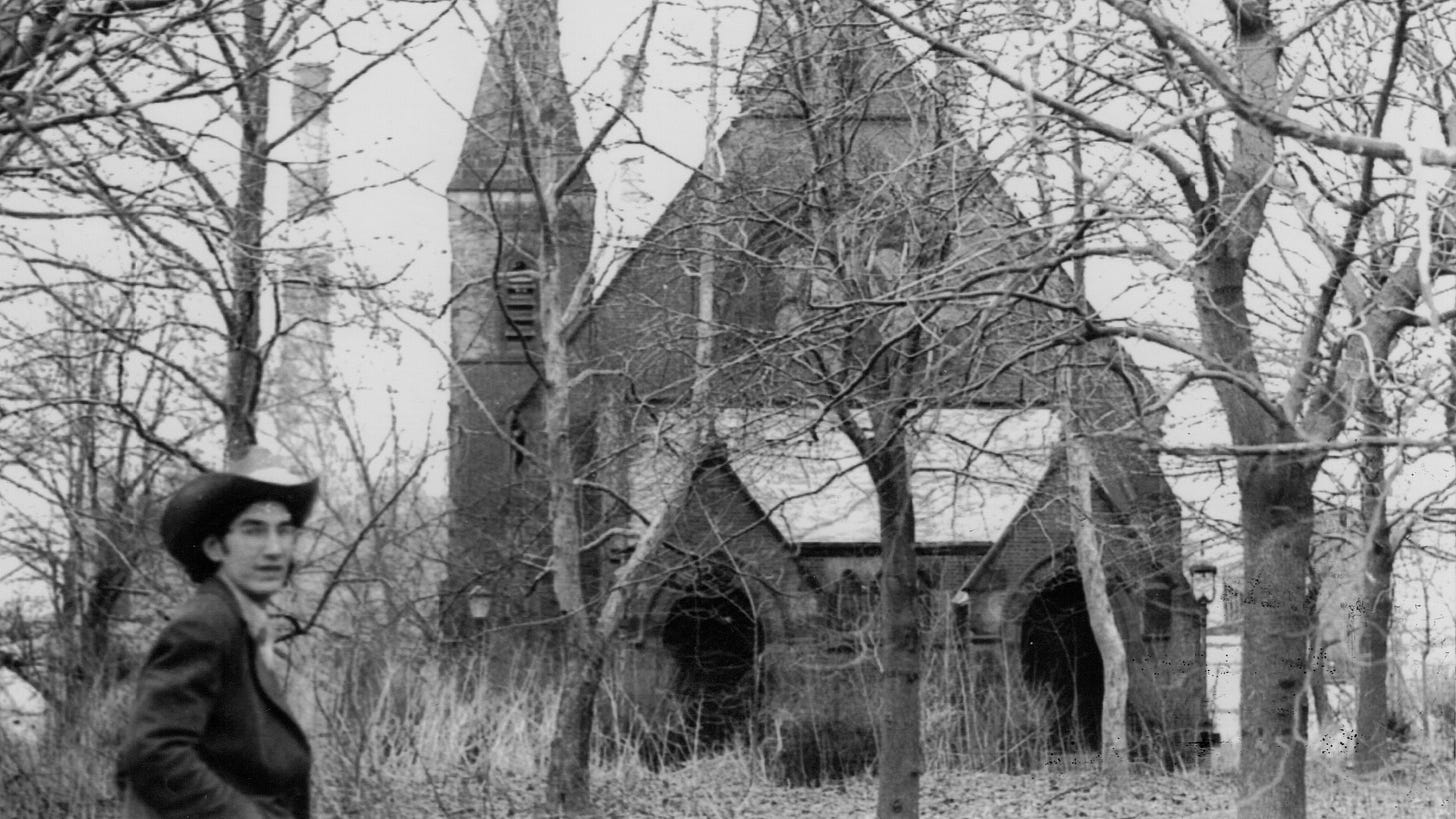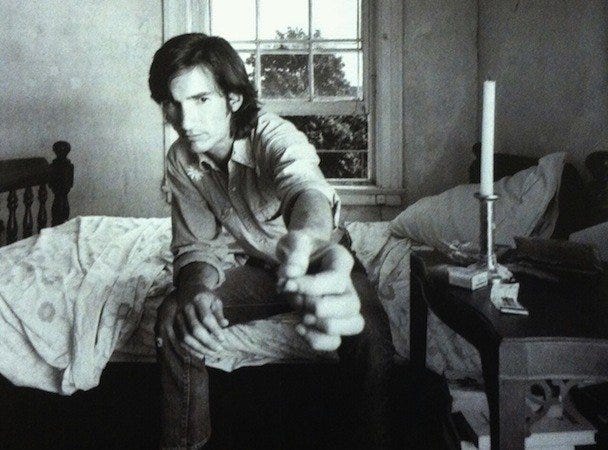Townes van Zandt was born into oil wealth, with a powerful disposition towards substance abuse and self-harm. Townes barely made it through high school before bouncing around multiple universities, eventually flunking out of UC Boulder due to severe depression and binge-drinking. Upon visiting home, he underwent insulin-shock therapy, which erased much of his long-term memory and closed the door on Townes ever being a normal guy. He went back to school at University of Houston and enrolled in the pre-law program. When his father died in 1966, Townes went ahead and dropped out of school for good, going on the road and committing to a life of songwriting.
Townes lived hard, real hard, right up until the day he died of heroin and alcohol addiction in 1997. He could be cruel to his friends and collaborators, but treated no one worse than himself. Townes is on my “Mount Rushmore” of songwriters, a devilishly clever wordsmith who penned abstract, bluesy country songs that were shot through a painful streak of nihilism.
Nihilism is one of those ideas that you associate with the stoned college freshman who said Nothing even matters, dude, before hitting the joint you rolled and forgetting to hand it back. But despite its dumber adherents, the idea that nothing matters - that life is meaningless, that religious and moral vales are worthless - has always exerted a powerful grip on the sufferers of the world. It comes across loud and clear in “Nothin,” one of Townes’ most finest (and briefest) songs, the final track on the 1971 album Delta Momma Blues.
Recently divorced from his first wife, Townes wrote Delta Momma Blues in a deep depression as he abused heroin and alcohol.
Hey mama, when you leave
Don't leave a thing behind
I don't want nothin'
I can't use nothin'
//
Take care into the hall
And if you see my friends
Tell them I'm fine
Not using nothin'
This song starts with reference to Townes’ recent breakup, but it spirals quickly into an even darker, near-suicidal place. He tells his ex not to leave anything behind; he has no use for it. But he does have one request: tell his friends that he isn’t “using.” Is it true?
I’m fascinated by the word choice - “Take care into the hall” is such an odd set of words. This is such a carefully phrased song that the choice is likely related to counting consonants. But in the framing of these lines, Townes reveals more than it first appears.
In the first stanza, Townes’ wife is leaving. But the lack of physical detail makes it sound like he is broadly describing a situation - not a scene. But in the next stanza, he imagines his wife literally going “into the hall,” grounding us in the moment and making it seem like she is about to leave the room they share. What’s more, he thinks she might “see his friends,” reflecting the paranoid mindset of an addict. Townes imagines that his friends are huddled just outside, worrying about him.
Almost burned out my eyes
Threw my ears down to the floor
I didn't see nothin'
I didn't hear nothin'
//
I stood there like a block of stone
Knowin' all I had to know
And nothin' more
Man, that's nothin'
Townes said that this song was written after reading The Last Temptation of Christ, and the language here feels properly Biblical. It depicts a severe, abstract anguish, positioning the breakup as withdrawal, or a psychedelic trial from God.
Being born is going blind
And bowing down a thousand times
To echoes strung
On pure temptation
This is a breakup song, and a song about everything (and how nothing it is), but it is implicitly a song about how horrible it is to be a drug addict. We hear that birth is a terrible fate, that we are all doomed to bowing down to the “echoes strung out on pure temptation.” The language is too abstract for me to speak definitively, but it certainly feels freighted with the realities of severe drug addiction.
Sorrow and solitude
These are the precious things
And the only words
That are worth rememberin'
The final stanza is the song’s mission statement. And as I read it over, as I think about it closely, it dawns upon me that I may have misunderstood this song. Because up until now, I have always thought this song represented a nasty strain of nihilism that bordered on suicidal. But every piece of biographical evidence on hand suggests that Townes Van Zandt did not, in fact, want to die. He once fell out of a fourth-story window “to see what it felt like,” he drank and drugged himself to oblivion, but there are no suicide attempts on record, and he lived into his 50s. The artist who sang about “waitin’ around to die” didn’t seem to be in any hurry to get there.
In that context, the final stanza can take on a different tone. In the depths of his addiction and loneliness, doing his best to write through the pain, Townes alights on sorrow and solitude. He names them perfect things, the only words worth remembering. If you take him seriously, and ignore the prior stanzas, they do not really depict an unhealthy mind. Solitude can be healthy, even cleansing, and sorrow is the proper reaction to a divorce. In zeroing in on these feelings - in narrowing his focus - he names mantras and subtly elucidates a stoic philosophy, describing a meditative state that will allow him to carry on. To live another journey around the sun, to get to the next show, the song - or maybe the next high. Whatever gets you through the day.








I really enjoyed this Dani. Townes is one of my favorite songwriters as well, probably my favorite if I had to choose. Townes would often talk about how some of his songs came from another place, the sky, the Earth.. Like he was just a vehicle for a song/idea that had been floating around. Do you think there is something to that, or do you think he was very intentional with his words?
I actually just published my first attempt at writing about Townes a couple days ago with a focus on "what made him so great?" In case you're interested.
https://open.substack.com/pub/samjamieson/p/drunk-degenerate-genius-poet?r=jkbnn&utm_campaign=post&utm_medium=web